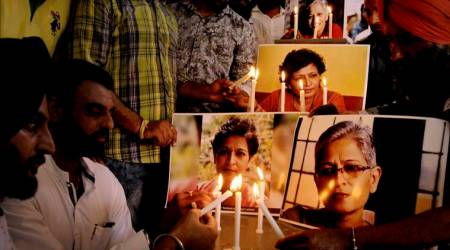 Mumbai: Journalists pay tributes to journalist Gauri Lankesh, in Mumbai on Wednesday. (PTI Photo)
Mumbai: Journalists pay tributes to journalist Gauri Lankesh, in Mumbai on Wednesday. (PTI Photo)
The next time the trolls tell you to go to Pakistan, sit tight exactly where you are and you could soon reach your destination. Or, since the universe is relativistic, your destination will reach you. The atmosphere of violence and impunity developing in India is bringing home the very lawlessness which has bedevilled our neighbour. Irrespective of who ordered the assassination of journalist, publisher and activist Gauri Lankesh, and who pulled the trigger, environmental degradation in politics and ethics helped to make the unbelievable possible. The Indian media have always stumped up for the bloggers of Bangladesh, who work constantly under the threat of a bloody death. But now we have problems of our own.
The rapidity with which protests rolled out following the assassination of Bangalore journalist, publisher and activist Gauri Lankesh, is remarkable. An enormity is usually followed by a period of restless calm while the news sinks in. It takes time for people to accept that what should be unimaginable in a working democracy has become a reality. But in this case, protests began hours after the murder, in the dead of night, and gathered momentum as the days passed. Now, people no longer have to wait to let the news sink in. The sinking feeling is permanent, and protest may soon become mainstream politics. When the Opposition has become incapable of representing the dissenting majority, this is inevitable.
The response to the murder has put the spotlight on trolls and those who feed them. Lankesh’s killing was followed by some obscene glee on social media, revolting even by the lax standards of our time. A creature with no respect for the dead obviously has no respect for life either, and belongs in the darkness beyond the pale of civilisation. At least one of these unsavoury characters was followed by the prime minister’s handle and for the first time, people want to know why. Of course, IT minister Ravi Shankar Prasad issued a strong moral statement against celebrants of Lankesh’s murder. Readers may have seen this, but they should also look at the replies on Twitter, where the trolls reared out of the ooze of the depths to gibber at him, often accompanied with the hashtag #FOE — “Family Over Everything”. When you open a can of worms, it is standard operating procedure to keep a bigger can handy.
It has been rightly pointed out that Lankesh’s killing has drawn extraordinary attention because she worked in English, apart from Kannada. This is inevitable, since English is a power language which cuts across borders, both within and outside India. Besides, this cannot be in any way detract from the importance of the incident. Journalists are killed and intimidated because it works, and because in less than perfect systems, you can even get away with it.
In 2006, Moscow saw a similar assassination — noted Putin critic Anna Politkovskaya of Novaya Gazeta was shot dead in the lift of her apartment building. The Guardian is one of several news organisations to note that in the decade since, coverage critical of the Kremlin has dwindled in the Russian Press. Politkovskaya had survived serious intimidation and poisoning, but the shooting did the trick. Five assailants who had taken a contract on her life were identified and tried. However, the trail went cold there: who awarded the contract is still unknown. The authorities would like to regard the case as closed. Novaya Gazeta insists that it is not, until the people who authorised their colleague’s assassination are identified.
While the US-based Committee to Protect Journalists is in the news for requesting proper police investigation of Lankesh’s murder, a coinmuch smaller organisation in the UK published an interesting finding this week, which went unnoticed here. Media Lens, the London-based press watchdog which has won the Gandhi Peace Foundation award (instituted by Richard Attenborough), has quantitatively analysed coverage of Hurricane Harvey and the floods in South Asia, where the death toll has been about 20 times higher. In the British national press, “coverage from the US dominated South Asia by a factor of almost 30 to 1, even though the scale of deaths and flooding was far greater in the latter,” they report. “There was some good coverage of both, notably in The Guardian. But the general trend was glaring. Somehow, people in South Asia just don’t matter as much as Americans; or Westerners in general.”

